#Denise McNair
Photo

Dudley Randall, Ballad of Birmingham, Designed by Shirley Woodson, Broadside No. 1, Broadside Press, Detroit, MI, 1965 ['Broadside Press: Poetry to the People', Collection of the Smithsonian National Museum of African American History and Culture, Smithsonian Institution, Washington, DC. © Dudley Randall Literary Estate/Rare Book & Manuscript Library, University of Illinois at Urbana-Champaign]
#graphic design#poetry#broadside#dudley randall#shirley woodson#carole robertson#addie mae collins#cynthia wesley#denise mcnair#broadside press#national museum of african american history and culture#smithsonian institution#university of illinois rare book & manuscript library#1960s
21 notes
·
View notes
Text
youtube
Rhiannon Giddens - Birmingham Sunday (Official Audio)
Rhiannon Giddens
The 16th Street Baptist was a large and prominent church located downtown, just blocks from Birmingham's commercial district and City Hall. Just before 11 o'clock on September 15, 1963, instead of rising to begin prayers, the congregation was knocked to the ground. As a bomb exploded under the steps of the church, they sought safety under the pews and shielded each other from falling debris.
National Park Service. 16th Street Baptist Church Bombing (1963)
#music#rhiannon giddens#Addie Mae Collins#Denise McNair#Carole Robertson#Cynthia Wesley#kkk#terrorism#Youtube
2 notes
·
View notes
Text


On September 15, 1963, a bomb exploded during Sunday morning services in the 16th Street Baptist Church in Birmingham, Alabama, killing four young girls: Addie Mae Collins (14), Cynthia Wesley (14), Carole Robertson (14) and Carol Denise McNair (11).
54 notes
·
View notes
Text
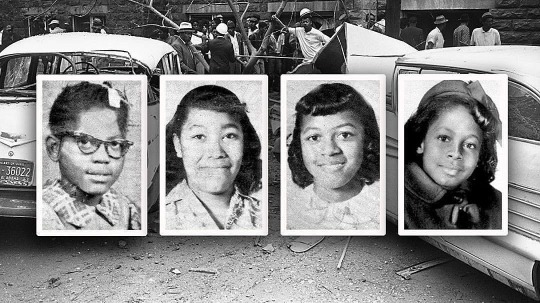
We will never forget the bombing at 16th Street Baptist Church in Birmingham, Alabama, on this date September 15, 1963.
From left to right:
Addie Mae Collins, 14.
Carole Robertson, 14.
Cynthia Wesley, 14.
Denise McNair 11.
A bomb planted by Ku Klux Klan members ripped through a Birmingham church, killing four little girls as they prepared for Sunday services.
The FBI determined that four members of a local KKK klavern known as the "Cahaba River Bridge Boys" were responsible for the bombing. The first prosecution didn't come until 1977. Then two more in the early 2000s. The fourth killer died, never being brought to account.
CARTER™️ Magazine carter-mag.com #wherehistoryandhiphopmeet #historyandhiphop365 #cartermagazine #carter #blackhistorymonth #blackhistory #history #staywoke #16thstreetbaptistchurch #saytheirnames
#carter magazine#carter#historyandhiphop365#wherehistoryandhiphopmeet#history#cartermagazine#today in history#staywoke#blackhistory#blackhistorymonth
180 notes
·
View notes
Text
instagram
Remembering the 16th Street Baptist Church Bombing
On September 15, 1963, the bombing of the 16th Street Baptist Church in Birmingham, AL, claimed the lives of four young girls—Addie Mae Collins, Cynthia Wesley, Carole Robertson, and Denise McNair. This tragic attack came at the height of the Birmingham Civil Rights Movement, galvanizing support for the struggle against racial injustice.
The outrage following this event helped pass the 1964 Civil Rights Act. This horrific act of hate shocked the nation and strengthened the fight for justice and equality. Today, we honor their memory by continuing to work for a world where love and peace triumph over hate.
#NeverForget#Birmingham1963#CivilRightsAct#ShiftTheCulture
#black history#four little girls#blacklivesmatter#black lives matter#racial injustice#black people#white terrorism#end white supremacy#blm movement#Instagram
22 notes
·
View notes
Text
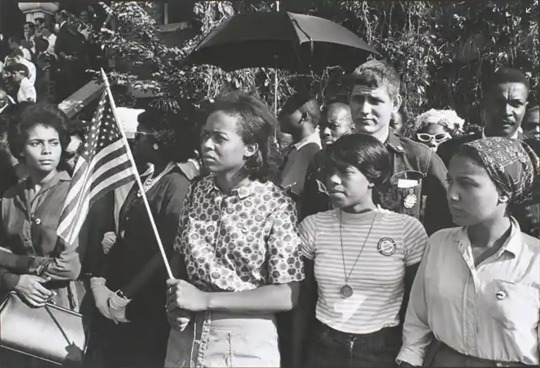
Danny Lyon Civil Rights Activists and Student Nonviolent Coordinating Committee Members (from left) Emma Bell, Dorie Ladner, Dona Richards, Sam Shirah, and Doris Derby at the Funeral of the Three of the Four Young Girls, Addie Mae Collins (age 14), Cynthia Wesley (14) and Carol Denise McNair (11) Killed in the KKK Bombing of the 16th St Baptist Church, Birmingham, AL 1963
46 notes
·
View notes
Text

Denise McNair's dress, 1962-63. McNair was one of the four girls killed during the Sixteenth Street Baptist Church Bombing in Birmingham, Alabama.
27 notes
·
View notes
Text

But we shared 9/11🤔
Sep.15.1963
*On Sunday, September 15, 1963, the 16th Street Baptist Church in Birmingham, Alabama, was bombed by four members of KKK. Addie Mae Collins, Denise McNair, Carole Robertson and Cynthia Wesley, four African-American girls between the ages of 11 and 14 who had been attending the church's Sunday school, were killed in the blast.
6 notes
·
View notes
Text
The Birmingham Church Bombing Occurred in Alabama, Killing four young Black Girls. September 15, 1963.
Image: The four girls killed in the bombing (clockwise from top left) Addie Mae Collins (14), Cynthia Wesley (14), Carole Robertson (14), and Carol Denise McNair (11). (Wikimedia Commons.)
On this day in history, September 15, 1963, the Birmingham Church bombing occurred when an explosive device detonated prior to Sunday morning services at the 16th Street Baptist Church in Birmingham, Alabama –…

View On WordPress
18 notes
·
View notes
Text

The 16th Street Baptist Church bombing was an act of white supremacist terrorism that occurred at the African-American 16th Street Baptist Church in Birmingham on Sunday, September 15, 1963. Four members of a local Ku Klux Klan chapter planted at least 15 sticks of dynamite attached to a timing device beneath the steps located on the east side of the church.
Four girls, Addie Mae Collins 14, Carol Denise McNair 11, Carole Robertson 14, and Cynthia Wesley were killed in the attack. The explosion was so intense that one of the girls’ bodies was decapitated and so badly mutilated in the explosion that her body could be identified only through her clothing and a ring. Another victim was killed by a piece of mortar embedded in her skull.
Described by Martin Luther King Jr. as “one of the most vicious and tragic crimes ever perpetrated against humanity” the explosion at the church killed four girls and injured 22 other persons.
Although the FBI had concluded that the 16th Street Baptist Church bombing had been committed by four known Ku Klux Klansmen and segregationists: Thomas Edwin Blanton Jr., Herman Frank Cash, Robert Edward Chambliss, and Bobby Frank Cherry, no prosecutions were conducted until 1977 when Robert Chambliss was tried and convicted of the first-degree murder of one of the victims, 11-year-old Carol Denise McNair.
In a revival of efforts by states and the federal government to prosecute cold cases from the civil rights era, the state conducted trials in the early 21st century of Thomas Edwin Blanton Jr. and Bobby Cherry, who were each convicted of four counts of murder and sentenced to life imprisonment in 2001 and 2002, respectively. Herman Cash died in 1994 and was never charged with his alleged involvement in the bombing.
The 16th Street Baptist Church bombing marked a turning point in the US during the civil rights movement and contributed to support for the passage by Congress of the Civil Rights Act of 1964. #africanhistory365 #africanexcellence
2 notes
·
View notes
Text
The Unofficial Black History Book
The 16th Street Baptist Bombing (September 15th, 1963)

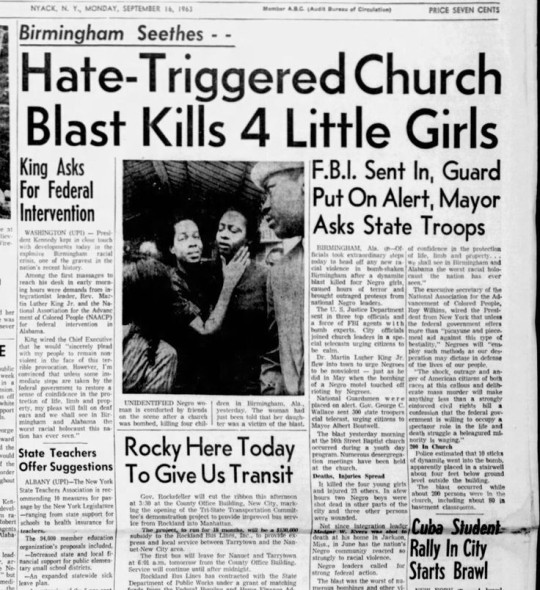


In the 1960s, Racial tension was at an all-time high. Many African Americans were doing their part in the fight for equal rights. A fight that claimed many innocent black lives.
Even the lives of four little girls.
This is the story.
The 16th Street Baptist Church was organized in 1873 as the first colored Baptist church in Birmingham, Alabama.
Many civil rights protest marches took place on the steps of the 16th Street Baptist Church. It has long been a significant religious center for the Black population and was a meeting place for civil rights organizers such as Dr. Martin Luther King Jr.
In the 1960s, Birmingham, Alabama, was one of America's most racially discriminatory and segregated cities and had one of the strongest and most violent chapters of the KKK. The city's police commissioner, Eugene "Bull" Connor, was known for his willingness to use brutality in combating radical union members, demonstrators, and innocent black citizens. Alabama's governor, George Wallace, was the leading opponent of desegregation.
By 1963, homemade bombs being set off in black homes and churches were such common occurrences that the city was given the nickname “Bombingham."
On September 15th, 1963, at 10:22 a.m., some 200 church members were in the building; most were attending Sunday school classes before the 11 a.m. service that morning.
A dynamite bomb was set off in the back stairwell, and mortar and bricks were thrown from the front of the church, caving in its walls. The violent blast ripped through the wall, killing four young African-American girls and injuring more than 20 others.
14-year-old Addie Mae Collins, 14-year-old Denise McNair, 14-year-old Carole Robertson, and 11-year-old Cynthia Wesley were in the basement of the church's ladies' restroom when they were crushed by the rubble.
Addie's sister, Sarah Collins, survived but lost her right eye.
The bombing of 16th Street Baptist Church was the third bombing in 11 days after a federal court order mandated the integration of Alabama's school system.
Upon learning of the attack, Reverend Martin Luther King Jr. sent a telegram to Alabama Governor George Wallace. He stated bluntly: "The blood of our little children is on your hands."
In the aftermath of the bombing, thousands of angry black protesters gathered at the scene of the bombing that same evening, and violence broke out across the city. Governor Wallace sent police and state troopers to break up the protesters. A handful of protesters were arrested, and two African-American youths were killed.
One at the hands of the police. And the other was murdered by a mob of white men.
This all happened before the National Guard was called to restore order.
The deaths of the four girls and the brutal attack shocked the nation and drew international attention to the violent struggle for civil rights in Birmingham.
Many whites were as outraged by the bombing as blacks and offered condolences to the families.
Over 8,000 people attended the girls' funeral services at Reverend John Porter's Sixth Avenue Baptist Church. The family of the fourth held a smaller private service. Dr. King spoke before the 8,000 people at the service.
It was a clear act of racial hatred, -- as the church was a key Civil Rights meeting place and had been a frequent target of bomb threats. KKK members routinely called in bomb threats intended to disrupt civil rights meetings and services.
In the investigation of the bombing, many of Birmingham's white supremacists and even certain individuals were immediately suspected. Repeated calls for the perpetrators to be brought to justice went unanswered for more than a decade.
It was revealed later that the FBI had information concerning the identity of the bombers in 1965 but did nothing.
The head of the FBI at the time was J. Edgar Hoover. He disapproved of the civil rights movement. It was rumored and claimed that Hoover held back evidence from prosecutors and even tried to block prosecution. He later died in 1972.
In 1977, Alabama Attorney General Bob Baxley reopened the investigation.
Klan leader Robert E. Chambliss was brought to trial for the bombings and was convicted of murder. He died in prison in 1985, still maintaining his innocence.
Later in 1980, 1988, and 1997, the case reopened again when two other former Klan members, Thomas Blanton, and Bobby Frank Cherry, were finally brought to trial. Blanton was convicted in 2001, and Cherry in 2002.
A fourth suspect, Herman Frank Cash, died in 1994 before he could be brought to trial.
The legal system was slow to provide justice, but the effect of the bombing was immediate and significant.
The outrage over the deaths of the four young girls helped build support for the struggle to end segregation. Support that would lead to the passage of both the Civil Rights Act of 1964 and the Voting Rights Act of 1965.
But even so, it couldn't bring back four young lives that were lost in an act of hatred.
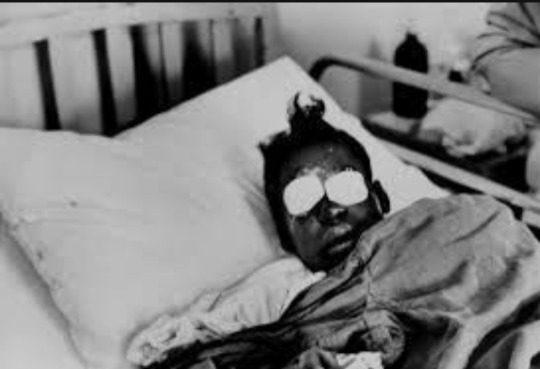
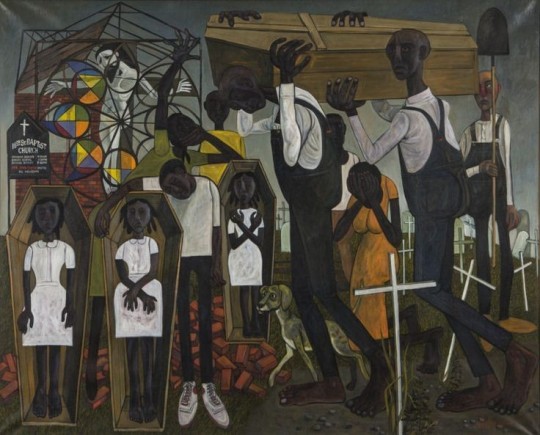
Painting: The 16th Street Baptist Chruch, By Mack Stanley - Asheville Art Museum
Prev
Phillis Wheatley
Next
Janet Collins
_____
My Resources
#black history matters#black history 365#black history is american history#black culture#black history#black tumblr#black lives fucking matter#protect black children#protect black lives#know your history#hate crimes#black stories#civil rights#learn your roots#black activism#protect black girls#civil rights movement#discrimination#history#social justice#cruel and unjust#the unofficial black history book#black female writers#say her name
13 notes
·
View notes
Text
CHRONOLOGY OF AMERICAN RACE RIOTS AND RACIAL VIOLENCE p-5
1961
May First Freedom Ride.
1962
Harlem Youth Opportunities Unlimited (HARYOU) is founded.
Robert F. Williams publishes Negroes with Guns, exploring Williams’ philosophy of black self-defense.
October Two die in riots when President John F. Kennedy sends troops to Oxford,Mississippi, to allow James Meredith to become the first African American student to register for classes at the University of Mississippi.
1963
Publication of The Fire Next Time by James Baldwin.
Revolutionary Action Movement (RAM) is founded.
April Rev. Martin Luther King, Jr., writes his ‘‘Letter from Birmingham Jail.’’
June Civil rights leader Medgar Evers is assassinated in Mississippi.
August March on Washington; Rev. King delivers his ‘‘I Have a Dream’’ speech before the Lincoln Memorial in Washington, D.C.
September Four African American girls—Carol Denise McNair, Cynthia Wesley, Carole Robertson, and Addie Mae Collins—are killed when a bomb explodes at theSixteenth Street Baptist Church in Birmingham, Alabama.
1964
June–August Three Freedom Summer activists—James Earl Chaney, Andrew Goodman, and Michael Schwerner—are arrested in Philadelphia, Mississippi; their bodies are discovered six weeks later; white resistance to Freedom Summer activities leads
to six deaths, numerous injuries and arrests, and property damage acrossMississippi.
July President Lyndon Johnson signs the Civil Rights Act.
New York City (Harlem) riot.
Rochester, New York, riot.
Brooklyn, New York, riot.
August Riots in Jersey City, Paterson, and Elizabeth, New Jersey.
Chicago, Illinois, riot.
Philadelphia, Pennsylvania, riot.
1965
February While participating in a civil rights march from Selma to Montgomery, Alabama,
Jimmie Lee Jackson is shot by an Alabama state trooper.
Malcolm X is assassinated while speaking in New York City.
March Bloody Sunday march ends with civil rights marchers attacked and beaten by local lawmen at the Edmund Pettus Bridge outside Selma, Alabama.
Lowndes County Freedom Organization (LCFO) is formed in Lowndes County,Alabama.
First distribution of The Negro Family: The Case for National Action, better known as The Moynihan Report, which was written by Undersecretary of Labor Daniel Patrick Moynihan and Nathan Glazer.
July Springfield, Massachusetts, riot.
August Los Angeles (Watts), California, riot.
1965–1967
A series of northern urban riots occurring during these years, including disorders in the Watts section of Los Angeles, California (1965), Newark, New Jersey (1967), and
Detroit, Michigan (1967), becomes known as the Long Hot Summer Riots.
1966
May Stokely Carmichael elected national director of the Student Nonviolent Coordinating Committee (SNCC).
June James Meredith is wounded by a sniper while walking from Memphis, Tennessee, to Jackson, Mississippi; Meredith’s March Against Fear is taken up by Martin Luther King, Jr., Stokely Carmichael, and others.
July Cleveland, Ohio, riot.
Murder of civil rights demonstrator Clarence Triggs in Bogalusa, Louisiana.
September Dayton, Ohio, riot.
San Francisco (Hunters Point), California, riot.
October Black Panther Party (BPP) founded by Huey P. Newton and Bobby Seale.
1967
Publication of Black Power: The Politics of Liberation by Stokely Carmichael and Charles V. Hamilton.
May Civil rights worker Benjamin Brown is shot in the back during a student protest in Jackson, Mississippi.
H. Rap Brown succeeds Stokely Carmichael as national director of the Student Nonviolent Coordinating Committee (SNCC).
Texas Southern University riot (Houston, Texas).
June Atlanta, Georgia, riot.
Buffalo, New York, riot.
Cincinnati, Ohio, riot.
Boston, Massachusetts, riot.
July Detroit, Michigan, riot.
Newark, New Jersey, riot.
1968
Publication of Soul on Ice by Eldridge Cleaver.
February During the so-called Orangeburg, South Carolina Massacre, three black college students are killed and twenty-seven others are injured in a confrontation with police on the adjoining campuses of South Carolina State College and Claflin College.
March Kerner Commission Report is published.
April Dr. Martin Luther King, Jr., is assassinated in Memphis, Tennessee.
President Lyndon Johnson signs the Civil Rights Act of 1968.
Washington, D.C., riot.
Cincinnati, Ohio, riot.
August Antiwar protestors disrupt the Democratic National Convention in Chicago.
1969
May James Forman of the SNCC reads his Black Manifesto, which calls for monetary reparations for the crime of slavery, to the congregation of Riverside Church in New York; many in the congregation walk out in protest.
July York, Pennsylvania, riot.
1970
May Two unarmed black students are shot and killed by police attempting to control civil
rights demonstrators at Jackson State University in Mississippi.
Augusta, Georgia, riot.
July New Bedford, Massachusetts, riot.
Asbury Park, New Jersey, riot.
1973
July So-called Dallas Disturbance results from community anger over the murder of a twelve-year-old Mexican-American boy by a Dallas police officer.
1975–1976
A series of antibusing riots rock Boston, Massachusetts, with the violence reaching a climax in April 1976.
1976
February Pensacola, Florida, riot.
1980
May Miami, Florida, riot.
1981
March Michael Donald, a black man, is beaten and murdered by Ku Klux Klan members in Mobile, Alabama.
1982
December Miami, Florida, riot.
1985
May Philadelphia police drop a bomb on MOVE headquarters, thereby starting a fire that consumed a city block.
1986
December Three black men are beaten and chased by a gang of white teenagers in Howard Beach, New York; one of the victims of the so-called Howard Beach Incident is killed while trying to flee from his attackers.
1987
February–April Tampa, Florida, riots.
1989
Release of Spike Lee’s film, Do the Right Thing.
Representative John Conyers introduces the first reparations bill into Congress—the Commission to Study Reparation Proposals for African Americans Act; this and all subsequent reparations measures fail passage.
August Murder of Yusef Hawkins, an African American student killed by Italian-American youths in Bensonhurst, New York.
1991
March Shooting in Los Angeles of an African American girl, fifteen-year-old Latasha Harlins, by a Korean woman who accused the girl of stealing.
Los Angeles police officers are caught on videotape beating African American motorist Rodney King.
1992
April Los Angeles (Rodney King), California, riot.
1994
Survivors of the Rosewood, Florida, riot of 1923 receive reparations.
February Standing trial for a third time, Byron de la Beckwith is convicted of murdering civil rights worker Medgar Evers in June 1963.
18 notes
·
View notes
Text
youtube
Rhiannon Giddens singing “Birmingham Sunday” a song about the Ku Klux Klan’s bombing of the 16th Street Baptist Church in Birmingham, Alabama that killed four young girls—Addie Mae Collins (14), Cynthia Wesley (14), Carole Robertson (14), and Carol Denise McNair (11). This happened 60 years ago today on September 15, 1963.
_________________________
Birmingham Sunday
Songwriter: Richard Fariña
Come 'round by my side and I'll sing you a song
I'll sing it so softly it'll do no one wrong
On Birmingham Sunday the blood ran like wine
And the choir kept singing of freedom
That cold autumn morning no eyes saw the sun
And Addie Mae Collins, her number was one
In an old Baptist church there was no need to run
And the choir kept singing of freedom
The clouds, they were dark and the autumn wind blew
And Denise McNair brought the number to two
The falcon of death was a creature they knew
And the choir kept singing of freedom
The church, it was crowded and no one could see
That Cynthia Wesley's dark number was three
Her prayers and her feelings would shame you and me
And the choir kept singing of freedom
Young Carol Robertson entered the door
And the number her killers had given was four
She asked for a blessing, but asked for no more
And the choir kept singing of freedom
On Birmingham Sunday a noise shook the ground
And people all over the Earth turned around
For no one recalled a more cowardly sound
And the choir kept singing of freedom
The men in the forest, they once asked of me
How many black berries grow in the Blue Sea
I asked them right back with a tear in my eye
How many dark ships in the forest?
The Sunday has come, the Sunday has gone
And I can't do much more than to sing you a song
I'll sing it so softly it'll do no one wrong
And the choir keeps singing of freedom
8 notes
·
View notes
Text
60 years ago today, a bomb exploded during Sunday morning services in the 16th Street Baptist Church in Birmingham, Alabama, killing four young girls: Addie Mae Collins (14), Cynthia Wesley (14), Carole Robertson (14) and Carol Denise McNair (11).
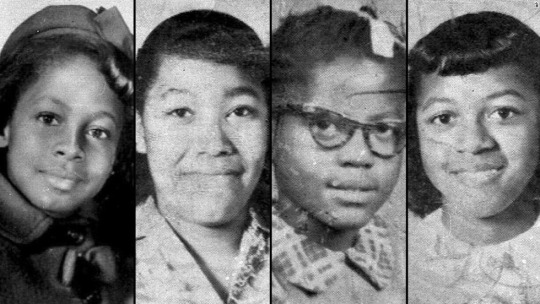
23 notes
·
View notes
Text
LETTERS FROM AN AMERICAN
September 15, 2023 (Friday)
HEATHER COX RICHARDSON
At 10:22 this morning, a Jewish temple in Birmingham, Alabama, blew the shofar, and churches rang their bells four times.
It was at that moment, sixty years ago, that a bomb ripped through the 16th Street Baptist Church in Birmingham, Alabama. It was Youth Day in the historic brick church on Sunday, September 15, 1963, and five young girls dressed in their Sunday best were in the ladies’ lounge getting ready for their part in the Sunday service that was about to start. As Denise McNair, Cynthia Wesley, Carole Robertson, and Addie Mae Collins were chatting and adjusting their dresses, a charge of dynamite stashed under the steps that led to the church sanctuary blasted into the ladies lounge, killing the four girls instantly. Standing at the sink in the back of the room, Addie’s sister Sarah survived with serious injuries.
Just five days before, Black children had entered formerly all-white schools after an August court order required an end to segregation in Birmingham’s public schools. This decision capped a fight over integration that had begun just after the May 1954 Brown v. Board of Education decision in which the Supreme Court declared segregation unconstitutional.
In that same year, in the wake of the successful 381-day Montgomery, Alabama, bus boycott to protest that city’s segregated bus system, Birmingham’s Reverend Fred Shuttlesworth, along with the Reverend Martin Luther King Jr., the Reverend Ralph Abernathy, and strategist and civil rights activist Bayard Rustin, started the Southern Christian Leadership Conference (SCLC) to challenge segregation through nonviolent protest, rather than trusting the work to the courts alone.
[.....]
The death of innocent children—on a Sunday morning, in a house of God—at the hands of white supremacists drew national attention. It woke up white people who had previously been leery of civil rights protests, making them confront the horror of racial violence in the South. Support for civil rights legislation grew, and in 1964 that support helped legislators to pass the Civil Rights Act.
Still, it seemed as if the individual bombers would get away with their crimes. In 1968, the FBI investigation ended without indictments.
But it turned out the story wasn’t over. Bill Baxley, a young law student at the University of Alabama in 1963, was so profoundly outraged by the bombing that he vowed someday he would do something about it. In 1970, voters elected Baxley to be Alabama’s attorney general. He reopened the case, famously responding to a Ku Klux Klan threat by responding on official state letterhead: “kiss my *ss.”
The reluctance of the FBI to share its evidence meant that Baxley charged and convicted only Robert Chambliss—whose nickname in 1963 was “Dynamite Bob”—for the murder of Denise McNair.
But still the story wasn’t over. Another young lawyer named Doug Jones was in the courtroom during that trial, and in 1997, President Bill Clinton appointed Jones as U.S. attorney for the Northern District of Alabama. Jones pursued the case, uncovering old evidence and finding new witnesses. Herman Cash had died, but in 2001 and 2002, representing the state of Alabama, Jones successfully prosecuted Thomas Edwin Blanton and Bobby Frank Cherry for first-degree murder.
Chambliss, Cherry, and Blanton all died in prison: Chambliss in 1985, Cherry in 2004. Blanton died in 2020.
—
LETTERS FROM AN AMERICAN
HEATHER COX RICHARDSON
#Letters from an American#Heather Cox Richardson#Alabama#history#racism#KKK#MLK Jr.#Bull Connor#segregation#integration
5 notes
·
View notes
Text
Books read and movies watched in 2023 (July to December):
Bolded verdicts (Yes!/Yes/Eh/No/NO) are links to more in-depth reviews! Should you watch/read them?
Books (fiction):
The Starless Sea (Erin Morgenstern): No
The Inheritance of Orquídea Divina (Zoraida Córdova): Yes
Brave New World (Aldous Huxley): No
The Association of Small Bombs (Karan Mahajan): No
Pond (Claire-Louise Bennett): NO
Heaven (Mieko Kawakami): No
The Verifiers (Jane Pek): No
The Old Capital (Yasunari Kawabata): No
Falling Man (Don DeLillo): No
A Free Life (Ha Jin): Yes
People of the Book (Geraldine Brooks): No
The Spectacular (Fiona Davis): No
Klara and the Sun (Kazuo Ishiguro): Yes
Children of the Jacaranda Tree (Sahar Delijani): No
This Place: 150 Years Retold (anthology): Yes
Books (nonfiction):
The Forgetting River (Doreen Carvajal): Eh
Valiant Women: The Extraordinary American Servicewomen Who Helped Win World War II (Lena S. Andrews): Yes
Mozart's Starling (Lyanda Lynn Haupt): Yes
Poetic Form & Poetic Meter (Paul Fussell): No
Western Wind: An Introduction to Poetry (David Mason & John Frederick Nims): No
A Poetry Handbook (Mary Oliver): Yes
We Should Not Be Friends (Will Schwalbe): No
Seen from All Sides (Sydney Lea): No
Books (poetry):
Afterworlds (Gwendolyn MacEwen): Eh
Sailing Alone Around the Room (Billy Collins): Yes
Be With (Forrest Gander): No
Pictures from Brueghel and Other Poems (William Carlos Williams): Yes
Horoscopes For the Dead (Billy Collins): No
The Wild Iris (Louise Gluck): Eh
Moon Crossing Bridge (Tess Gallagher): Yes
Who Shall Know Them? (Faye Kicknosway): Yes
Great Blue (Brendan Galvin): No
Collected Poems (Basil Bunting): Eh
Paterson (William Carlos Williams): No
Selected Poems (Donald Justice): No
Dear Ghosts, (Tess Gallagher): No
The Death of Sitting Bear (N. Scott Momaday): No
Evidence (Mary Oliver): No
What Have I Ever Lost by Dying? (Robert Bly): Yes
Blessing the Boats (Lucille Clifton): Yes
Source (Mark Doty): No
Tell Me (Kim Addonizio): Eh
Zoo (Ogden Nash): No
Alive Together: New and Selected Poems (Lisel Mueller): No
“A” (Louis Zukovsky): NO
Flying at Night (Ted Kooser): Yes
The Man in the Black Coat Turns (Robert Bly): Yes
This Tree Will Be Here for a Thousand Years (Robert Bly): No
Nine Horses (Billy Collins): Yes
Arabian Love Poems (Nizar Kabbani): Yes
Delights & Shadows (Ted Kooser): Yes
This Great Unknowing (Denise Levertov): Yes
Young of the Year (Sydney Lea): No
Pursuit of a Wound (Sydney Lea): No
The Life Around Us (Denise Levertov): No
Red List Blue (Lizzy Fox): No
It Seems Like A Mighty Long Time (Angela Jackson): No
Some Ether (Nick Flynn): Yes
Divide These (Saskia Hamilton): No
The Simple Truth (Philip Levine): No
Saving Daylight (Jim Harrison): Eh
Midnight Salvage (Adrienne Rich): No
The Trouble with Poetry and Other Poems (Billy Collins): Eh
My Brother Running (Wesley McNair): Eh
Whale Day (Billy Collins): Eh
Talking Dirty to the Gods (Yusek Komunyakaa): No
A New Selected Poems (Galway Kinnell): No
The Dolphin (Robert Lowell): No
Star Route (George Longenecker): No
Brute (Emily Skaja): Eh
No Witnesses (Paul Monette): Yes!
Blood, Tin, Straw (Sharon Olds): No
Town Life (Jay Parini): No
Dead Men's Praise (Jacqueline Osherow): No
Stag's Leap (Sharon Olds): No
Sleeping with the Dictionary (Harryette Mullen): No
Looking for the Parade (Joan Murray): No
Sparrow (Carol Muske-Dukes): Yes
You can't Get There from Here (Ogden Nash): No
Carver: a Life in Poems (Marilyn Nelson): Yes
The House of Blue Light (David Kirby): No
Ariel (Sylvia Plath): No
Caribou (Charles Wright): No
The Collected Verse of Theodore Roethke: No
Letters from Maine (Mary Sarton): No
Diasporic (Patty Seyburn): Eh
The Five Stages of Grief (Linda Pastan): Yes!
Not One Man’s Work (Leland Kinsey): Yes
Wise Poison (David Rivard): Yes
The Continuous Life (Mark Strand): Eh
On the Bus with Rosa Parks (Rita Dove): Yes
Fuel (Naomi Shihab Nye): Yes
Ludie’s Life (Cyntha Rylant): Yes
Wise Poison (David Rivard): Yes
My Name on His Tongue (Laila Halaby): Yes
Messenger (Ellen Bryant Voigt): Yes!
Unfortunately, it was Paradise: Selected Poems (Mahmoud Darwish): Eh
The Collected Poetry of James Wright: No
The Unlovely Child (Norman Williams): No
The New Young American Poets (anthology, 2000): Yes
The Black Maria (Aracelis Girmay): Yes!
Night Sky with Exit Wounds (Ocean Vuong): Yes!
Thoughts of Her. (Casey Conte): NO
Standing Female Nude (Carol Ann Duffy): Yes!
The Tradition (Jericho Brown): Yes
Girls That Never Die (Safia Elhillo): No
Repair (C. K. Williams): No
The Big Smoke (Adrian Matejka): Yes
American Wake (Kerrin McCadden): Eh
Collected Poems (Jane Kenyon): No
E-mails from Scheherazad (Mohja Kahf): Yes!
I Had a Brother Once (Adam Mansbach): No
Holding Company (Major Jackson): No
Hunting Down the Monk (Adrie Kusserow): No
Happy Life (David Budbill): No
Prelude to Bruise (Saeed Jones): No
Wade in the Water (Tracy K. Smith): Eh
Penury (Myung Me Kim): Yes!
Commons (Myung Mi Kim): Yes!
The Final Voicemails (Max Ritvo): No
Pieces of Air in the Epic (Brenda Hillman): No
Gone (Fanny Howe): No
A Vermonter's Heritage: Listening to the Trees (Rick Bessette): No!
Roget's Illusion (Linda Bierds): No
First Hand (Linda Bierds): No
The Other Side (Julia Alvarez): No
Pig Dreams: Scenes from the life of Sylvia (Denise Levertov): Yes
Movies:
Winter Evening in Gagra (1985, Karen Shakhnazarov): Yes
My Tender and Affectionate Beast (A Hunting Accident) [1978, Emil Loteanu]: No
Fate of a Man (1959, Sergei Bondarchuk): Eh
Ordinary Fascism (aka Triumph Over Violence) (1965, Mikhail Romm): Yes
The Most Charming and Attractive (1985, Gerald Bezhanov): Yes
Gals/The Girls (1961, Boris Bednyj): Yes
Drunken Angel (1948, Akira Kurosawa): Yes
Stray Dog (1949, Akira Kurosawa): No
Viy (1967, Konstantin Yershov/Georgi Kropachyov): No
Battleship Potemkin (1925, Sergei Eisenstein): Yes
Amarcord (1973, Federico Fellini): Yes!
Charade (1963, Stanley Donen): No
Dreams (1990, Akira Kurosawa): Yes!
Barton Fink (1991, Coen Brothers): No
Kidnapping, Caucasian Style (1967, Leonid Gaidai): No
Unbelievable Adventures of Italians in Russia (1974, Eldar Ryazanov & Franco Prosperi): Yes
By the White Sea (2022, Aleksandr Zachinyayev): Yes
Ivan’s Childhood (1962, Andrei Tarkovsky): Yes!
The Third Man (1949, Carol Reed): Yes!
The Kitchen in Paris (2014, Dmitriy Dyachenko): No
Optimistic Tragedy (1963, Samson Samsonov): Eh
White Moss (2014, Vladimir Tumayev): Yes
Oppenheimer (2023, Christopher Nolan): Yes!
Scarlet Sails (1961, Alexandr Ptushko): Yes
We'll Live Till Monday (1968, Stanislav Rostotsky): Yes
Vladivostok (2021, Anton Bormatov): No
Ballad of a Soldier (1959, Grigory Chukhray): Yes
The Theme (1979, Gleb Panfilov): Yes
A Haunting in Venice (2023, Kenneth Branagh): Yes
Barbie (2023, Greta Gerwig): Yes
Is It Easy To Be Young? (1986, Juris Podnieks): Yes
Badlands (1973), Terrence Malick: Yes
Satyricon (1969, Federico Fellini): No
Aguirre, the Wrath of God (1972, Werner Herzog): Yes
Fitzcarraldo (1982, Werner Herzog): No
The Illusionist (2006, Neil Burger): Yes
The Duchess (2008, Saul Dibb): Yes
Pride & Prejudice (2005, Joe Wright): Yes!
Emma (1996, Douglas McGrath): No
And here’s Part 1 of my 2023 list!
2 notes
·
View notes